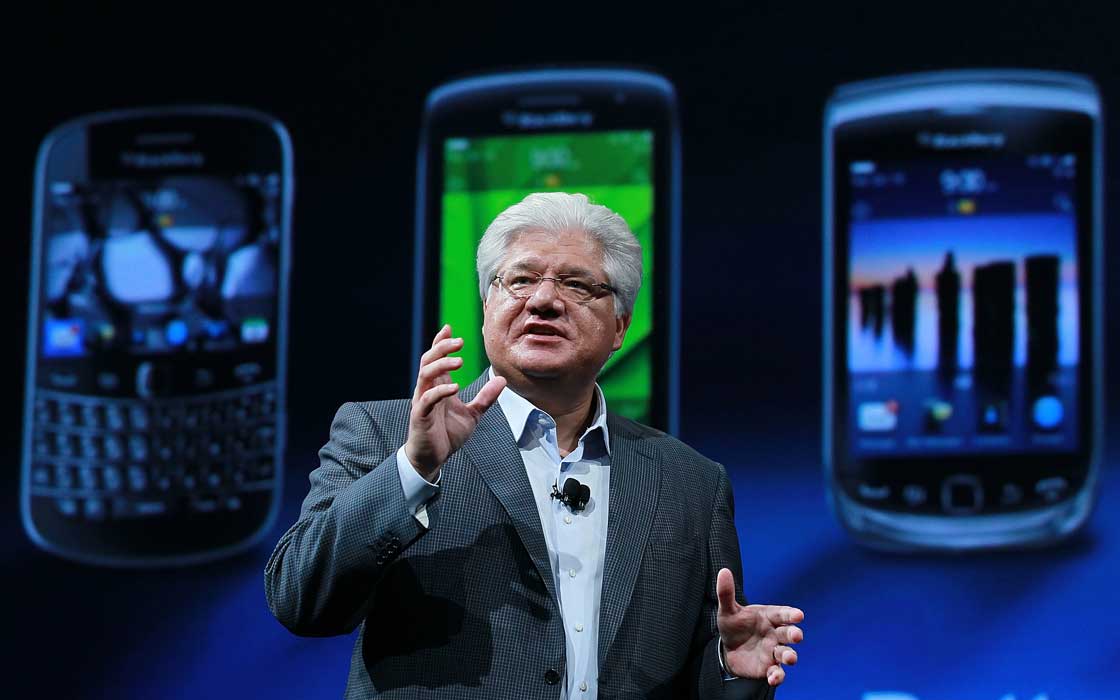TORONTO – BlackBerry delivered a US$98-million profit in its fourth quarter, surprising analysts who had expected the smartphone maker to report a loss as it launched its new high-end touchscreen smartphone.

The Waterloo, Ont.-based company, which spent much of the quarter rolling out its BlackBerry Z10 in the United Kingdom, Canada and elsewhere, said it shipped about one million of the smartphones during the reporting period.
The quarter, which ended March 2, didn’t include Z10 sales from the United States since major U.S. carriers didn’t start rolling out the smartphone until last week. The U.S. sales of the BlackBerry 10 devices will begin to be reflected in the company’s fiscal first quarter, which ends June 1.
“We’ve made great progress and we’re proud of it, but we’re also well grounded,” said president and CEO Thorsten Heins in a conference call with analysts.
“Everyone at BlackBerry understands there’s more work to do, and delivering BlackBerry 10 and getting back to a profitable quarter is just our starting line — not the finish line.”
BlackBerry said its marketing spending, which can include publicity as well as behind-the-scenes incentives with carriers, will increase by 50 per cent but it did not provide specific financial commitments.
In its outlook, BlackBerry said it expects to “approach break-even” results in the first quarter of its current financial year based on lower costs, a more efficient supply chain and improved hardware margins.
- What is a halal mortgage? How interest-free home financing works in Canada
- Capital gains changes are ‘really fair,’ Freeland says, as doctors cry foul
- Budget 2024 failed to spark ‘political reboot’ for Liberals, polling suggests
- Tesla’s net income drops 55% in first quarter amid falling global sales
The company, which formerly called itself Research In Motion (TSX:BB), reported a profit of 19 cents US per share for quarter ended March 2, compared with US$125 million or 24 cents per share loss a year ago.
Analysts had expected on average a loss of 29 cents per share, according to estimates compiled by Thomson Reuters.
Revenue increased to $2.68 billion, coming in below expectations of $2.84 billion, according to a poll of analysts by Thomson Reuters.
“At this point, it’s cautious optimism,” said Colin Cieszynski, a market analyst at CMC Markets Canada of the results.
“They have still obviously have a long road to go to get back to where they were. They have very formidable competition but so far they seem to be doing OK.”
About 55 per cent of customers who have bought the BlackBerry touchscreen phone are migrating from competitor’s devices, Heins said. However, overall shipments of BlackBerrys, which include older models, dropped to six million devices from 6.9 million in the third quarter.
BlackBerry’s subscriber base, which had been growing until the third quarter, was also on the downswing with a decrease to 76 million from 79 million, a sign that more people ditched their Blackberry in favour of competitors’ phones.
The drop was mostly in North America and Europe, though it was partly offset by more subscribers in Latin America and Asia.
“The challenge they’re running up against is they need to get these BB10 (devices) out faster to the market to abate that erosion,” said Richard Tse, an analyst at Cormark Securities Inc.
Tse said he is optimistic that the company will rise above expectations for handset sales, partly because he believes most analysts have “conservative” estimates considering the 223 carriers around the world that have the technical approvals to sell the new phones.
BlackBery also announced Thursday, co-founder Mike Lazaridis will step down as director of the company on May 1, though he has no plans to sell his large stake in the firm.
Lazaridis is the company’s second-biggest shareholder with a 5.7 per cent stake.
BlackBerry has yet to launch the keypad version of its new smartphones, though Heins said it remains on track to hit stores next month.
Heins said the company chose to launch a touchscreen model before the keypad version to address the growing popularity of employers allowing their workers to use the phone of their choice at the office, a trend known as “bring-your-own-device” within the industry. Many employees have gravitated towards touchscreen phones like Apple’s iPhone and Android devices like the Samsung Galaxy S3.
“This is where we need to be,” Heins said.
BlackBerry shares closed up 29 cents at $15.09 on the Toronto Stock Exchange on Thursday.


Comments